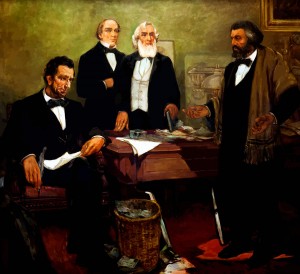This post is part of our Black History Month blog series.
Happy Valentine’s Day everyone! Frederick Douglass adopted February 14 as his birthday because his mother used to call him her “little valentine,” so today’s Black History Month post is dedicated to him.
Douglass met with Lincoln several times (in fact, he was once invited to tea at the Soldiers’ Home, but didn’t make it). He came away from these meetings impressed with the President since “In his company, I was never reminded of my humble origin, or of my unpopular color.” He also praised the Emancipation Proclamation, fondly remembering “the outburst of joy and thanksgiving that rent the air when the lightning brought to us the emancipation proclamation.”
 “Frederick Douglass Appealing to President Lincoln” by William Edouard Scott, 1943
“Frederick Douglass Appealing to President Lincoln” by William Edouard Scott, 1943
On the other hand, Douglass was cynical about Lincoln’s dedication to abolition and black civil rights. Perhaps the speech that best exemplified his mixed views on Lincoln was the keynote speech he gave at the dedication of the Emancipation Memorial at Lincoln Park in D.C. in 1876. In it, he frankly stated that Lincoln “was preeminently the white man’s President, entirely devoted to the welfare of white men.” Yet, “though Mr. Lincoln shared the prejudices of his white fellow-countrymen against the Negro, it is hardly necessary to say that in his heart of hearts he loathed and hated slavery.” Regardless of his shortcomings, Douglass concluded, “because of his fidelity to union and liberty, he is doubly dear to us, and his memory will be precious forever.”
If that didn’t make his support of Lincoln clear, five years later in his 1881 biography, The Life and Times of Frederick Douglass, the orator wrote that Lincoln was the “greatest President” in American history.
(Though there are no contemporary photos, drawings or prints depicting Lincoln and Douglass meeting, I’ve attached a 1943 painting of the two discussing black enlistment.)
–Zachary Klitzman, Executive Assistant at President Lincoln’s Cottage
